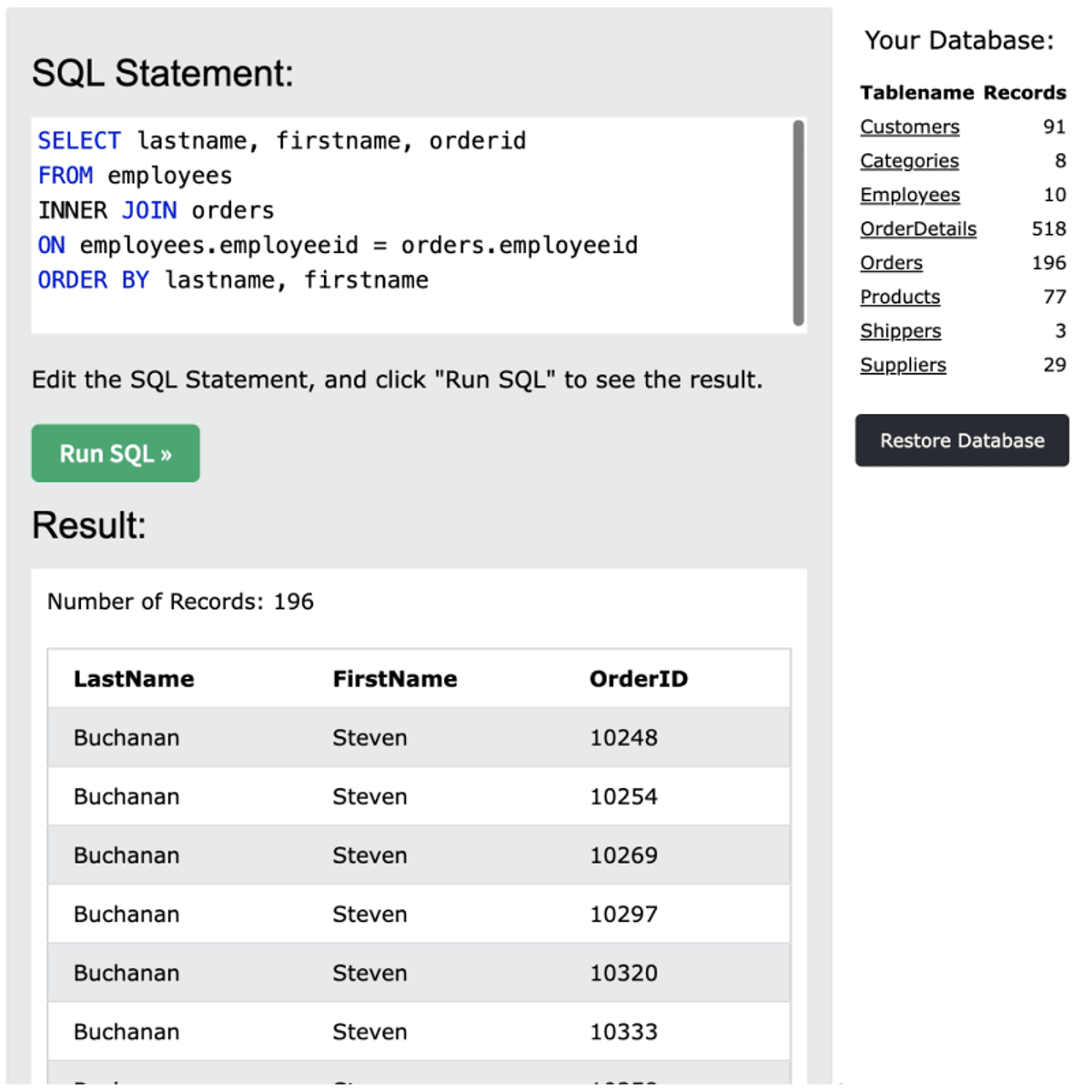
A database is an organized collection of data that has value to a business. The purpose of SQL is to extract specific data needed to solve a business problem—or answer a business question. In this project, you will work with the Northwind Traders database, which contains data for the fictitious company Northwind Traders. Your task will be to pull data from the database to answer the question “Which Northwind Traders employees should get bonuses for their sales performance?”
What's inside
Syllabus
Good to know
Save this course
Activities
Organize and review course materials
Show steps
Ensure a smooth learning experience by organizing your course resources.
Show steps
-
Gather and organize lecture notes, assignments, and materials
-
Create a study guide or summary of key concepts
-
Set up a dedicated study space
Review SQL fundamentals
Show steps
Strengthen your foundation in SQL before starting the course.
Browse courses on
SQL Syntax
Show steps
-
Review online tutorials or documentation
-
Practice writing basic SQL queries
-
Take a refresher course or workshop
Solve SQL coding problems
Show steps
Reinforce your understanding of SQL syntax and query optimization techniques.
Browse courses on
SQL Queries
Show steps
-
Identify a SQL coding problem
-
Analyze the problem and design a solution
-
Write and execute the SQL query
-
Verify the results and optimize the query
Four other activities
Expand to see all activities and additional details
Show all seven activities
Review SQL queries with a study group
Show steps
Enhance your understanding of SQL by discussing queries and techniques with peers.
Browse courses on
SQL Queries
Show steps
-
Form a study group with fellow classmates
-
Choose a SQL query or problem to work on
-
Discuss the query and identify different approaches
-
Review and compare the results
Build a SQL database and create reports
Show steps
Demonstrate your proficiency in SQL by creating a practical database application.
Browse courses on
Database Design
Show steps
-
Design and create a SQL database schema
-
Populate the database with sample data
-
Write SQL queries to extract and analyze data
-
Create reports using SQL or data visualization tools
Write a blog post or article on SQL best practices
Show steps
Solidify your understanding of SQL and share your knowledge with others.
Browse courses on
Database Optimization
Show steps
-
Identify common SQL best practices and techniques
-
Write a blog post or article sharing your insights
-
Publish and promote your content
Contribute to an open-source SQL project
Show steps
Build your skills and give back to the SQL community.
Browse courses on
SQL Programming
Show steps
-
Identify an open-source SQL project to contribute to
-
Study the project codebase and documentation
-
Implement a new feature or fix an issue
-
Submit a pull request and collaborate with the project team
Organize and review course materials
Show steps
Ensure a smooth learning experience by organizing your course resources.
Show steps
- Gather and organize lecture notes, assignments, and materials
- Create a study guide or summary of key concepts
- Set up a dedicated study space
Review SQL fundamentals
Show steps
Strengthen your foundation in SQL before starting the course.
Browse courses on
SQL Syntax
Show steps
- Review online tutorials or documentation
- Practice writing basic SQL queries
- Take a refresher course or workshop
Solve SQL coding problems
Show steps
Reinforce your understanding of SQL syntax and query optimization techniques.
Browse courses on
SQL Queries
Show steps
- Identify a SQL coding problem
- Analyze the problem and design a solution
- Write and execute the SQL query
- Verify the results and optimize the query
Review SQL queries with a study group
Show steps
Enhance your understanding of SQL by discussing queries and techniques with peers.
Browse courses on
SQL Queries
Show steps
- Form a study group with fellow classmates
- Choose a SQL query or problem to work on
- Discuss the query and identify different approaches
- Review and compare the results
Build a SQL database and create reports
Show steps
Demonstrate your proficiency in SQL by creating a practical database application.
Browse courses on
Database Design
Show steps
- Design and create a SQL database schema
- Populate the database with sample data
- Write SQL queries to extract and analyze data
- Create reports using SQL or data visualization tools
Write a blog post or article on SQL best practices
Show steps
Solidify your understanding of SQL and share your knowledge with others.
Browse courses on
Database Optimization
Show steps
- Identify common SQL best practices and techniques
- Write a blog post or article sharing your insights
- Publish and promote your content
Contribute to an open-source SQL project
Show steps
Build your skills and give back to the SQL community.
Browse courses on
SQL Programming
Show steps
- Identify an open-source SQL project to contribute to
- Study the project codebase and documentation
- Implement a new feature or fix an issue
- Submit a pull request and collaborate with the project team
Career center
Business Analyst
Data Analyst
Database Architect
Database Administrator
Data Scientist
Data Engineer
Epidemiologist
Information Security Analyst
Operations Research Analyst
Machine Learning Engineer
Market Researcher
Statistician
Software Developer
Financial Analyst
Actuary
Reading list
Share
Similar courses
OpenCourser helps millions of learners each year. People visit us to learn workspace skills, ace their exams, and nurture their curiosity.
Our extensive catalog contains over 50,000 courses and twice as many books. Browse by search, by topic, or even by career interests. We'll match you to the right resources quickly.
Find this site helpful? Tell a friend about us.
We're supported by our community of learners. When you purchase or subscribe to courses and programs or purchase books, we may earn a commission from our partners.
Your purchases help us maintain our catalog and keep our servers humming without ads.
Thank you for supporting OpenCourser.



